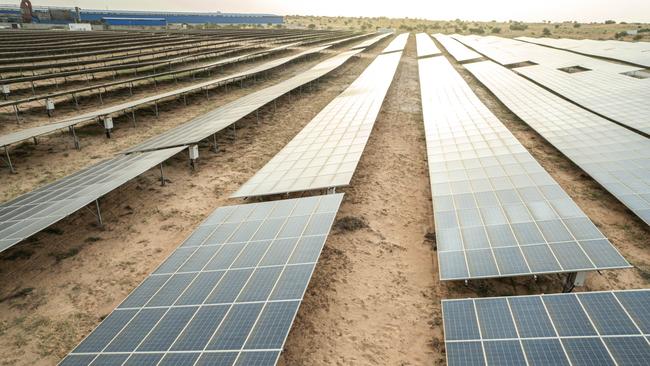Investors warn the ‘price of everything’ will increase without 2035 target certainty
The Coalition is being warned the ‘price of everything’ will go up if there’s no certainty over Australia’s 2035 target.

Investors have warned the Coalition that energy costs will increase if they don’t put forward and pursue a 2035 emissions reduction target, while business leaders say the major parties must maintain bipartisanship on net zero by 2050 and offer credible pathways to get there.
Some opposition MPs have cautioned Peter Dutton against embracing a 2035 target, with some Nationals MPs adamant that the junior Coalition party won’t support one, forcing business and investor groups to outline what action on climate change they think must be detailed at the next election.
Investor Group on Climate Change policy managing director Erwin Jackson, whose association represents members with more than $30 trillion in global assets, said both major parties had committed to the Paris Agreement and “therefore the establishment of a 2035 target and an economy-wide plan to achieve it”.
“Knowing what Australia’s emissions pathway is between 2030 to 2050 is a critical input into investment decisions in assets like energy infrastructure, which can last for 50 years,” Mr Jackson told The Australian.
“Without clarity on Australia’s 2035 target and pathway to net zero emissions, the cost of everything will increase. Uncertainty means risk and higher costs. This will start with energy, seeing higher energy costs and then the price of everything.”
While some Coalition MPs are pushing the opposition to reconsider its endorsement of net zero emissions, which is unlikely to occur, Australian Industry Group chief executive Innes Willox said business was looking for a credible and realistic 2035 target that was broadly uniform and adopted across the economy, amid concerns the states – which have promised 2035 targets of between 70 to 80 per cent – will “run more and more off on their own and set targets which aren’t real and achievable”.
“The Coalition would have to argue as to why they didn’t want to set a target. We think there’s benefits in targets because they give you the goal, as long as they’re clear and achievable,” he said. “If the government sets a 2035 target, they have to consult very broadly across the economy so it’s workable. We’re also talking to the Coalition as well around the same principles – how do you achieve sustainable emissions reduction without damaging your economy?”
Mr Willox said targets leading up to 2050 were good but it was up to the Coalition how it framed them, arguing a 2040 target with nuclear in the energy mix was “as justified as setting a 2035 target”.
Business Council of Australia chief executive Bran Black supported setting a 2035 target, pointing out a transition pathway beyond the 2030 target was required for a net zero economy by 2050. The BCA is consulting its members on a 2035 target as the government considers what to set its target at.
“Targets should be both ambitious and practical, and that means making the most of decarbonisation and investment opportunities while also not imposing unnecessary costs on the economy,” Mr Black said.
Australian Chamber of Commerce and Industry chief executive Andrew McKellar said the bipartisan commitment should be maintained. “What we would expect as we go towards COP29 and 30 (in 2024 and 2025) (is) countries increasingly developing more specific targets beyond 2030 to 2035,” Mr McKellar said.
“Obviously they need to be credible targets over that time frame. Whether or not that’s the case for both major parties, we would expect at a minimum the major parties must elaborate something about the policies and the trajectory to get to net zero by 2050.”
Parties to the Paris Agreement, including Australia, “shall communicate a nationally determined contribution every five years”.
The Albanese government is due to release its 2035 target by February next year.
Opposition climate change and energy spokesman Ted O’Brien was asked for a response to the calls for clarity from investors and business and whether it would take a 2035 target to the next election, but declined to respond.
Deputy Liberal leader Sussan Ley has previously promised the Coalition will put forward “effective and affordable climate targets” at the next poll.




To join the conversation, please log in. Don't have an account? Register
Join the conversation, you are commenting as Logout